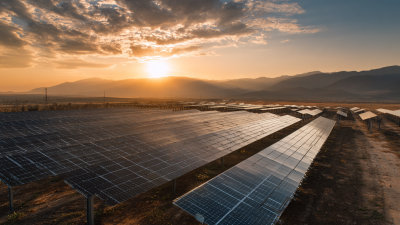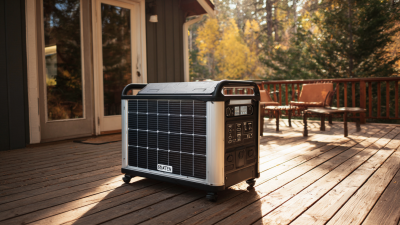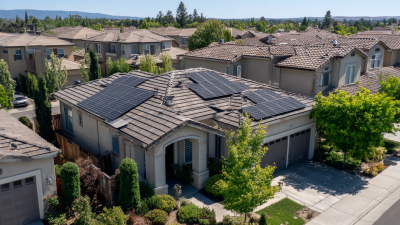MH Energy Your Better Solar and Energy Partner
MH Energy Your Better Solar and Energy Partner
As the demand for renewable energy continues to rise, many homeowners and businesses are turning to solar power as a sustainable solution. According to the Solar Energy Industries Association (SEIA), the residential solar market has grown by over 167% in the past five years, with more people recognizing the cost savings and environmental benefits of solar energy.

A 10kw Solar Power System is an optimal choice for many as it strikes a balance between power generation and affordability, catering to a wide range of energy needs. In fact, this system size is ideal for households with larger energy consumption patterns, making it a popular option among consumers looking to reduce their electricity bills and carbon footprint.
By understanding how to select the best 10kw Solar Power System for your unique requirements, you can not only enhance your energy efficiency but also contribute to a more sustainable future.
When selecting the best 10kW solar power system for your needs, there are several key factors to consider to ensure optimal performance and efficiency. Firstly, assess your energy consumption patterns. Understanding how much electricity you use will help determine if a 10kW system can sufficiently meet your requirements. Keep in mind that factors such as local climate, shading from trees or buildings, and the orientation of your solar panels can significantly affect the system's performance.
Tips: Consider using a solar monitoring system to track energy production and consumption in real-time. This can help you adjust your energy usage habits and maximize the efficiency of your solar power system.
Another crucial factor is the quality and reliability of the components of the solar power system. Look for reputable manufacturers that offer high-efficiency solar panels and inverters, as these will have a significant impact on the overall efficiency of your system. It’s also wise to check warranty periods and customer support options, which can provide peace of mind in your investment.
Tips: Research and read reviews about different brands before making a decision. Reach out to previous customers to get insights into their experiences with the system and after-sales service.
When selecting a 10kW solar power system, it's essential to evaluate different solar panel brands and their unique features. Each brand offers distinct advantages, which can significantly influence the efficiency and longevity of your solar energy system. Leading brands like SunPower, LG, and Canadian Solar have established themselves in the market due to their advanced technology, high efficiency ratings, and reliable warranties. For instance, SunPower panels are known for their robust performance and industry-leading efficiency, while LG offers sleek designs coupled with excellent output and durability.
In addition to performance, consider the warranties and customer support that each brand provides. A strong warranty can provide peace of mind, ensuring that your investment is protected for years to come. Moreover, the availability of local support services can be crucial for maintenance and any troubleshooting that might arise. Brands like Trina Solar may present a more budget-friendly option without significantly compromising on quality, making them an attractive choice for many homeowners.
Ultimately, understanding the nuances between these brands will help you make an informed decision that best fits your energy needs and budget.
When considering a 10kW solar power system, understanding the cost structure is essential for financial planning. The total price is influenced by various factors, including equipment quality, installation costs, and the chosen solar panel brand. Most 10kW solar systems range from $15,000 to $30,000 before any available tax credits or incentives; however, this broad range can be narrowed down based on specific requirements. For instance, opting for premium panels can significantly increase upfront costs, yet these may offer enhanced efficiency and warranties, potentially leading to better long-term savings.
Additionally, installation costs often vary significantly based on location, installer experience, and site conditions. In urban areas where competition is fierce, you might find better deals compared to rural areas. Moreover, homeowners should not overlook the importance of financial incentives, such as federal tax credits and state-specific rebates, which can substantially reduce the overall investment. By conducting thorough research and obtaining multiple quotes, you can ensure that you’re making an informed decision that aligns with your budget and energy needs.
When considering the installation of a 10kW solar power system, understanding the specific installation requirements is crucial. First, assess your property's roof space and orientation. Ideally, a south-facing roof with minimal shading will optimize energy production. Additionally, the structural integrity of your roof must be evaluated to ensure it can support the weight of the solar panels and withstand local weather conditions. Local building codes and regulations should also be reviewed, as they may dictate the type of mounting systems and permits required.
Once the system is installed, regular maintenance is key to maximizing its efficiency. This includes routine inspections to check for dirt, debris, or snow accumulation on the panels, which can impede performance. Monitoring the system's output through a solar monitoring app will help you quickly identify any drops in efficiency, indicating a need for attention. Moreover, it’s advisable to schedule professional cleaning and servicing at least once a year to address any potential issues and ensure the system operates at peak performance throughout its lifespan.

When choosing a 10kW solar power system, understanding performance metrics such as efficiency and energy output is essential for making an informed decision. Recent studies emphasize the importance of efficiency characterization in solar systems. For instance, various residential photovoltaic battery storage systems have been analyzed for their performance, revealing key metrics that can significantly affect your energy generation capabilities. Additionally, exploring hybrid systems—such as those combining PV with wind and energy storage—can yield better efficiency, particularly in scenarios where energy supply is variable.
Tips for comparing different 10kW systems include checking the efficiency ratings provided by manufacturers, which typically represent the amount of sunlight converted into usable electricity. Look for performance data from real-world applications, as these can give insight into how a system performs under various conditions. Moreover, consider conducting a comparative analysis of different storage systems available in the market, as their ability to store excess energy can influence overall system productivity and sustainability. Always prioritize systems that not only offer high output but also demonstrate reliability in diverse environmental contexts.







